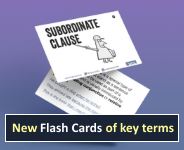Topic: Verb
Verbs are a very important word class, including words for actions (he walked home) and states (she is at home). They can be marked for present or past tense (walks, walked).
Englicious contains many resources for English language in schools, but the vast majority of them require you to register and log in first. For more information, see What is Englicious?

